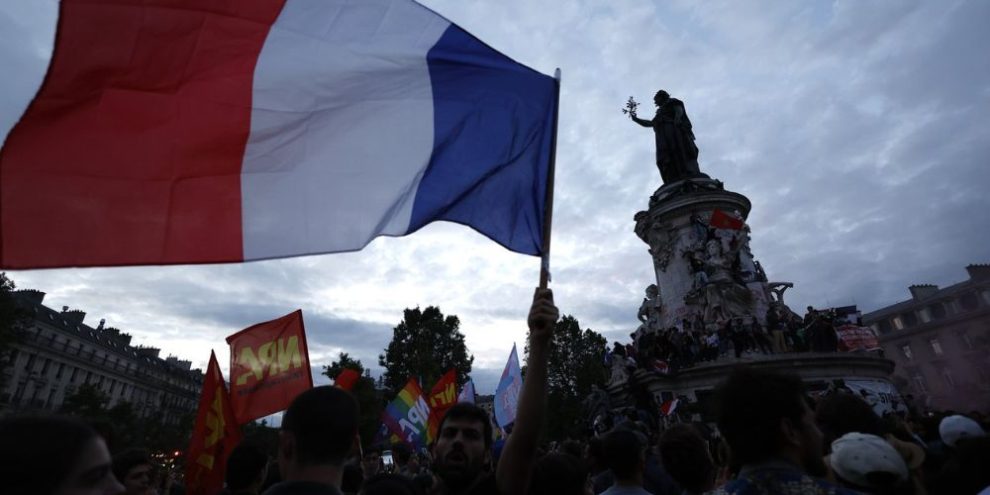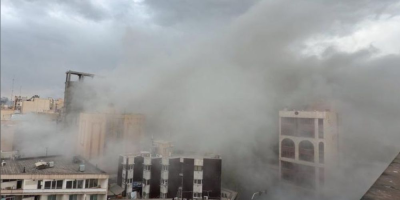
French President Emmanuel Macron refused the resignation of the country’s prime minister, asking him on Monday to remain temporarily as the head of the government after chaotic election results left the government in limbo.
French voters split the legislature on the left, centre and far right, leaving no faction even close to the majority needed to form a government. The results from Sunday’s vote raised the risk of paralysis for the European Union’s second-largest economy.
Macron gambled that his decision to call snap elections would give France a “moment of clarification,” but the outcome showed the opposite, less than three weeks before the start of the Paris Olympics, when the country will be under an international spotlight.
France’s main share index opened with a dip, but quickly recovered, possibly because markets had feared an outright victory for the far right or the leftist coalition.
Prime Minister Gabriel Attal had said he would remain in office if needed but offered his resignation Monday morning. Macron, who named him just seven months ago, immediately asked him to stay on “to ensure the stability of the country.” Macron's top political allies joined the meeting with Attal at the presidential palace, which ended after about 90 minutes.
Attal on Sunday made clear that he disagreed with Macron’s decision to call the surprise elections. The results of two rounds of voting left no obvious path to form a government for either the leftist coalition that came in first, Macron’s centrist alliance, or the far right.
Newly elected and returning lawmakers were expected to gather at the National Assembly to begin negotiations in earnest.
Macron himself will leave midweek for a NATO summit in Washington.
Barrie's News Delivered To Your Inbox
By submitting this form, you are consenting to receive marketing emails from: Central Ontario Broadcasting, 431 Huronia Rd, Barrie, Ontario, CA, https://www.cobroadcasting.com. You can revoke your consent to receive emails at any time by using the SafeUnsubscribe® link, found at the bottom of every email. Emails are serviced by Constant Contact
Political deadlock could have far-ranging implications for the war in Ukraine, global diplomacy and Europe’s economic stability. Still, at least one leader said the results were a relief.
“In Paris enthusiasm, in Moscow disappointment, in Kyiv relief. Enough to be happy in Warsaw,” Prime Minister Donald Tusk, a former European Union Council head, wrote late Sunday on X.
According to official results released early Monday, all three main blocs fell far short of the 289 seats needed to control the 577-seat National Assembly, the more powerful of France’s two legislative chambers.
The results showed just over 180 seats for the New Popular Front leftist coalition, which placed first, ahead of Macron’s centrist alliance, with more than 160 seats. Marine Le Pen’s far-right National Rally and its allies were restricted to third place, although their more than 140 seats were still way ahead of the party’s previous best showing of 89 seats in 2022.
Macron has three years remaining on his presidential term.
Rather than rallying behind Macron as he'd hoped, millions took the vote as an opportunity to vent anger about inflation, crime, immigration and other grievances — including his style of government.
The New Popular Front’s leaders immediately pushed Macron to give them the first chance to form a government and propose a prime minister. The faction pledges to roll back many of Macron’s headline reforms, embark on a costly program of public spending, and take a tougher line against Israel because of its war with Hamas. But it's not clear, even among the left, who could lead the government without alienating crucial allies.
“We need someone who offers consensus,” said Olivier Faure, head of the Socialist Party, which joined the leftist coalition and was still sorting out how many seats it won on Monday.
Macron warns that the left’s economic program of many tens of billions of euros in public spending, partly financed by taxes on wealth and hikes for high earners, could be ruinous for France, already criticized by EU watchdogs for its debt.
A hung parliament is unknown territory for modern France and many people reacted with a mix of relief and apprehension.
“What pollsters and the press were telling us made me very nervous so it’s a huge relief. Big expectations as well,” said Nadine Dupuis, a 60-year-old legal secretary in Paris. “What’s going to happen? How are they going to govern this country?”
The political agreement between the left and centre to block the National Rally was largely successful. Many voters decided that keeping the far right from power was more important than anything else, backing its opponents in the runoff, even if they weren’t from the political camp they usually support.
“Disappointed, disappointed,” said far-right supporter Luc Doumont, 66. “Well, happy to see our progression, because for the past few years, we’ve been doing better.”
National Rally leader Le Pen, who was expected to make a fourth run for the French presidency in 2027, said the elections laid the groundwork for “the victory of tomorrow.”
Racism and antisemitism marred the electoral campaign, along with Russian disinformation campaigns, and more than 50 candidates reported being physically attacked — highly unusual for France.
Unlike other countries in Europe that are more accustomed to coalition governments, France doesn’t have a tradition of lawmakers from rival political camps coming together to form a majority. France is also more centralized than many other European countries, with many more decisions made in Paris.





